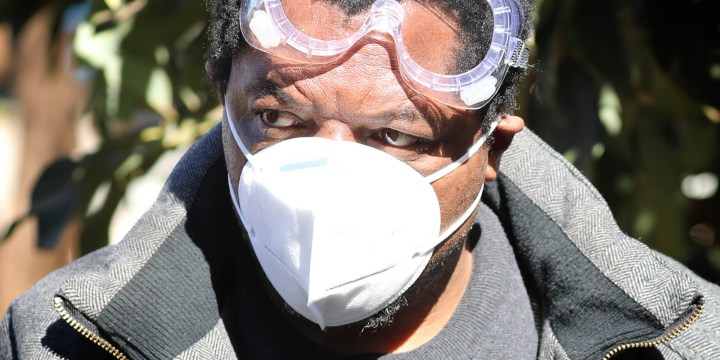NAT NAKASA AWARDS: OP-ED
Hopewell Chin’ono: Many African journalists are being persecuted for exposing the looting of public funds

Award-winning Zimbabwean filmmaker and journalist Hopewell Chin’ono delivered the keynote address at the South African National Editors’ Forum Nat Nakasa Awards on Saturday evening. Chin’ono, who spent 85 days in various Zimbabwean jails between 20 July 2020 and 27 January 2021, delivered his speech virtually after the failure of a court to hand over his passport to allow him to travel to Johannesburg. Here is Chin’ono’s address:
At the award ceremony, Daily Maverick CEO and co-founder Styli Charalambous was honoured with the prestigious annual industry award for courage. For a full list of the award recipients at Saturday night’s ceremony, see here:
I am deeply humbled to be here with you tonight and, more importantly, to have received the invitation to speak before you.
There is no greater recognition for any professional than the one which comes from your own professional peers.
It is even more so when the recognition is coming from your neighbours, and from a highly esteemed institution like the SANEF.
It is deeply painful that the road travelled by our brother colleague, Nat Nakasa, is still being travelled by many journalists across the continent, including myself in my own home country of Zimbabwe.
We should have been reading about Nat Nakasa’s difficult journey as a historical subject which doesn’t apply to today’s lived realities.
Unfortunately, this history keeps repeating itself on the African continent.
The cruelest aspect of this repeated history is that Nat Nakasa was a victim of apartheid, a crude yet legalised form of racist oppression.
Yet today hundreds if not thousands of journalists are subjected to the same environment of legalised political persecution by black governments that were meant to put an end to these state-sponsored indignities.
Just like under the apartheid regime, today we have many African journalists who are victimised by their own governments using legalised, trumped-up charges, the favourite ones being incitement and libel.
I have failed to be here with you tonight in person after SANEF wrote a letter to the Zimbabwean High Court for my passport to be released.
I have two trumped-up criminal charges hanging over my head.
I say this to demonstrate the fact that, just like under apartheid, many African governments continue to use lawfare through captured judiciaries, and state institutions like the police and intelligence services to fight robust journalism.
At the heart of apartheid was white supremacy, and a legalised looting spree by a few, whilst the majority wallowed in abject poverty without access to decent education and service delivery, or decent or fair opportunities to life.
Today African journalists are being persecuted for exposing the looting of public funds, and the plunder of Africa’s natural resources by a minority, but this time the looters are black political elites and their surrogates.
The biggest hospital in Zimbabwe, Sally Mugabe Hospital, has only two maternity theatres, which were built by the colonial regime in 1977. Only one of them is working today.
About 2,500 Zimbabwean women die giving birth every year in Zimbabwe; that is the equivalent of 15 jumbo jets crashing annually and killing only pregnant Zimbabwean women.
The main ingredient to this tragedy is the looting of public funds and the plunder of Zimbabwe’s natural resources.
US$100 million worth of gold is smuggled every month out of Zimbabwe by Zanu-PF elites and their surrogates.
To put this into perspective, ALL of Zimbabwe’s central hospitals require only US$50 million a year to run smoothly, but their two-year budget is being looted monthly and the ruling elites blame sanctions for a broken public healthcare system.
Like Nat Nakasa, many Zimbabweans have been forced to leave their own country of birth, running away from the intolerable harsh realities of life, including political persecution.
Fifty-five years after Nat Nakasa’s tragic and painful death, he would be upset to know that his fight against oppression has remained a fleeting illusion to be pursued, but not yet attained, in many parts of the continent.
Nat Nakasa would be upset to know that black African governments are persecuting black journalists who are merely doing their professional work.
He would be shocked to hear that Zimbabwe, which was the first country together with Nigeria to have television is sub-Saharan Africa, is still the only country of any significance in Africa that has only one television station, which is state-owned.
Nigeria now has more than 115 television stations; Zimbabwe remains stuck in the 1960s.
My invitation to speak here tonight is also a testimony to South Africa’s strong presence of a free press.
In my country, there are many institutions that are afraid to be associated with me for fear of being labelled anti-government and losing government contracts, and/or being harassed.
Many prominent Zimbabweans invite me into their homes, yet they are afraid for anyone else to know that I was in their home for dinner — the very same painful experiences that Nat and his generation went through.
My invitation to be here tonight is a powerful statement by South African journalism to the world: Whilst we continue to be politically persecuted for doing our work by rogue regimes, colleagues here stand with us in solidarity.
I am quite aware that my presence here tonight is not just about myself as an individual, I am representing many journalists across the continent who are under persecution.
Your invitation was not just for me, but for all journalists who are persevering under terrible conditions like what Nat Nakasa went through, and it serves as a beacon of hope for all of them, including myself.
May Nat Nakasa’s soul rest in peace. Thank you. DM


















 Become an Insider
Become an Insider
Keep fighting the good fight Hopewell, your labours bring light to the world.